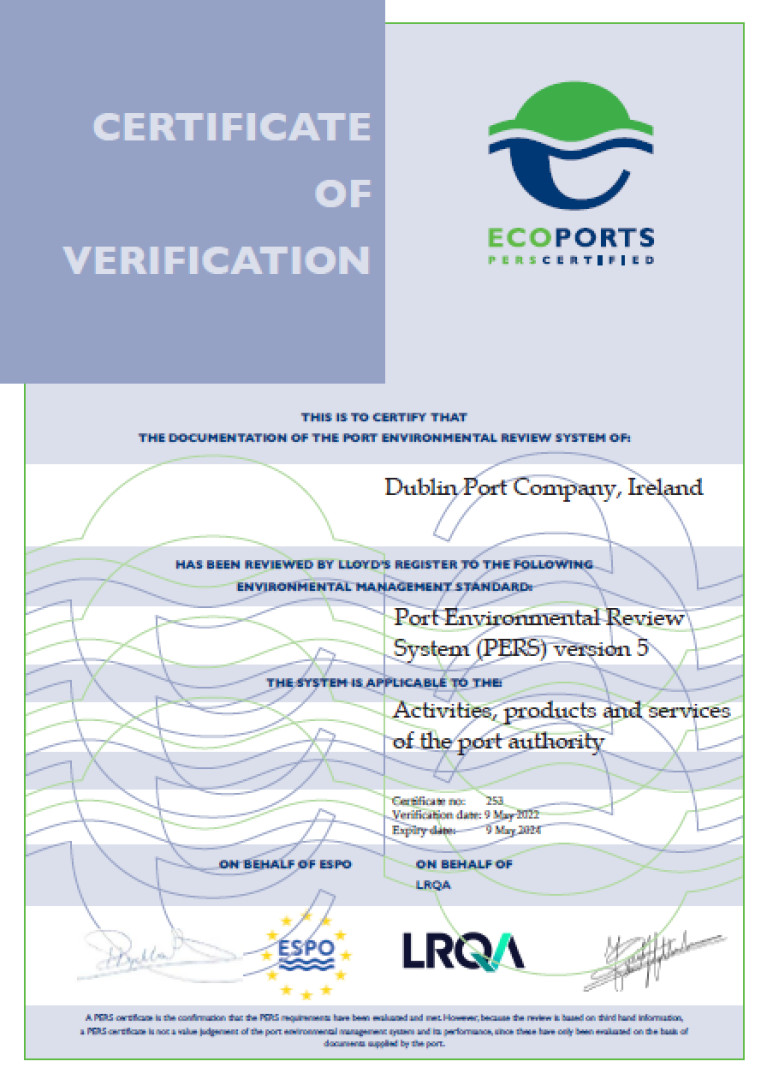Displaying items by tag: PERS Certified
Stronger than Ever as 'EcoPorts' Congratulated at European Sea Ports Organisation (ESPO) Conference
On the first day of the European Sea Ports Organisation (ESPO Conference held in Bremen, Germany today, the organisation congratulated the ports listed below for being certified through the EcoPorts’ environmental management standard (PERS).
Pers Ports: Grand Port Maritime de Dunkerque (France), Volos Port Authority (Greece), Port of Den Helder (the Netherlands), Autoridad Portuaria de Castellón (Spain), Autoridad Portuaria de Melilla (Spain), Santander Port Authority (Spain), Peterhead Port Authority (United Kingdom), Shoreham Port Authority (United Kingdom) and Asyaport Liman (Turkey).
Isabelle Ryckbost, ESPO Secretary General, Zeno D’Agostino, ESPO Chair, and Valter Selén, EcoPorts Coordinator, announced the PERS-certified ports during the annual ESPO Conference in Bremen.
Isabelle Ryckbost, ESPO Secretary General, commented: “It is great to see so many ports getting the PERS certification, either for the first time or getting a new certification. We know it takes an effort for ports to go through the process. We must not forget that considering the challenges ahead, the green agenda of ports is full. It is very rewarding to see that ports continue to do it and newcomers are joining.”
Valter Selén, ESPO Senior Policy Advisor and EcoPorts Coordinator, said: “The EcoPorts Network goes from strength to strength, with a growing number of ports joining the Network and becoming PERS-certified as part of their greening efforts. EcoPorts provides Europe’s ports with a means to demonstrate commitment to environmental management, and remains uniquely successful as a port-driven initiative on the European level. The recent PERS certification of 9 ports and the review of the SDM is testament to the continued relevance of the Network to ports in Europe.”
PERS (Port Environmental Review System) is the only port-specific environmental standard. The last five years have seen important increases in its recognition and membership, with 103 ports from 24 countries currently counting themselves as part of the EcoPorts Network, and 31 ports holding PERS certification. Compliance with the EcoPorts’ PERS standard is independently assessed by LRQA Nederland B.V. and the certificate has a validity of two years. EcoPorts’ PERS is revised after the 2-year period to make sure that the port continues to meet the requirements.
Reviewed Self-Diagnosis Method (SDM) further strengthens EcoPorts as the foremost environmental management tool for the port sector
The ESPO secretariat and the EcoPorts science coordinators have been reviewing the Self-Diagnosis Method (SDM). The SDM is a checklist that allows the port to identify and reflect on environmental risks, providing a snapshot of the environmental management efforts in the port. It includes all key indicators relevant to port environmental work, and a completed SDM is valid for a period of two years.
The SDM is usually reviewed every two to three years to account for new developments in port environmental management and sustainability. The exercise is intended to ensure the relevance and usefulness of the SDM as the entry point into the EcoPorts Network.
The updated SDM maintains the setup of the previous version, and remains in line with the international scope of EcoPorts. It strikes a careful balance between updating and renewing the SDM, and the ease of use of the SDM tool.
This latest review has seen the simplification, clarification and refinement of the SDM questionnaire. Key new indicators include whether the port has a roadmap for greening, whether the port monitors ambient and underwater noise, the possibility to allow battery charging and battery swapping in the port, agreements on the use of onshore power supply in ports, demand for alternative fuels, and the operational resilience of ports.
The reviewed SDM will ensure that the EcoPorts Network maintains its position as the foremost environmental management tool developed by ports, for ports.
For more information on EcoPorts’ PERS and SDM, click here.
Dublin Port Receives Sixth EcoPorts Environmental Management Standard (PERS) Certificate
Dublin Port has been congratulated by the European Sea Ports Organisation (ESPO), for being certified through the EcoPorts’ environmental management standard (PERS).
The Port of Dublin joined the EcoPorts’ network in 2008 and is PERS-certified for the sixth time.
Isabelle Ryckbost, ESPO Secretary General, commented: “The Port of Dublin is a textbook example of a fast-growing urban port that is embracing its nature, heritage and conservation. The findings of the Strategic Environmental Assessment (SEA), Environmental Report and Natura Impact Statements are integral part of the latest port Masterplan. It is very nice to see that ports like Dublin are continuously recertifying with PERS, making them long-term members of the Ecoports network”.
Valter Selén, ESPO Senior Policy Advisor and EcoPorts Coordinator, said: “We are very happy to see Dublin Port Company continues its incredible work on environmental management. Their sixth PERS-certification is evidence of continued self-improvement, and an inspiration to other major urban ports. We look forward to following the Port in its efforts to protect the environment and the wildlife around the port”.
PERS is the only port-specific environmental standard. The last five years have seen important increases in its recognition and membership, with 109 ports from 25 countries currently counting themselves as part of the EcoPorts Network, and 35 ports holding PERS certification. Compliance with the EcoPorts’ PERS standard is independently assessed by LRQA and the certificate has a validity of two years. EcoPorts’ PERS is revised after the 2-year period to make sure that the port continues to meet the requirements.
For additonal information on EcoPorts’ PERS, visit here inadditon to this website
























































